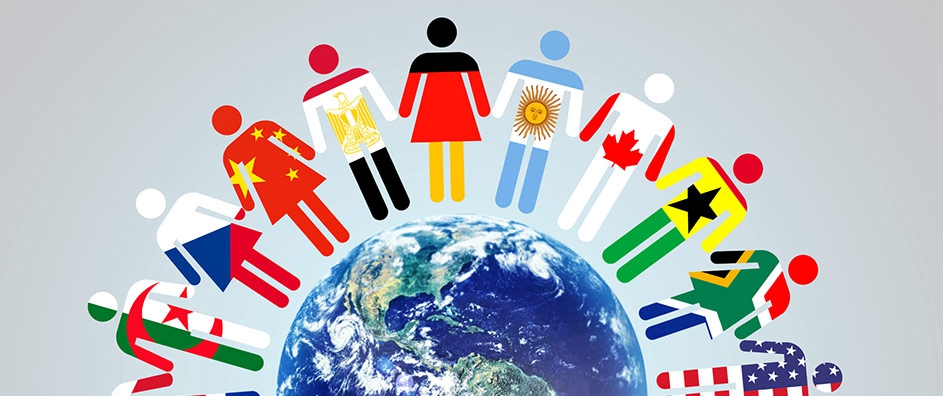The views expressed in our content reflect individual perspectives and do not represent the authoritative views of the Baha'i Faith.
Let’s say, just for the sake of discussion, that the leaders of the world decided to unite tomorrow. If that happened, how would we govern the planet?
Many people—historians, sociologists, political scientists and philosophers—have recommended the Baha’i model of global governance, with its focus on peace, disarmament, representative democracy and world unity.
The Baha’is themselves didn’t formulate this model. The primary goal of the Baha’i Faith–world unity–came directly from its prophet and founder, Baha’u’llah:
O Rulers of the earth! Be reconciled among yourselves, that ye may need no more armaments save in a measure to safeguard your territories and dominions. Beware lest ye disregard the counsel of the All-Knowing, the Faithful.
Be united, O Kings of the earth, for thereby will the tempest of discord be stilled amongst you, and your people find rest, if ye be of them that comprehend. Should any one among you take up arms against another, rise ye all against him, for this is naught but manifest justice….
The instruments which are essential to the immediate protection, the security and assurance of the human race have been entrusted to the hands, and lie in the grasp, of the governors of human society. – The Proclamation of Baha’u’llah, pp. 13-14.
Beginning in 1873, Baha’u’llah sent letters and tablets to the rulers and kings of the world, admonishing them to cease their practices of warfare, slavery, and excessive taxation for weaponry and oppression. He delivered a new, divine edict of peace to the world’s ruling elite, telling them that “the governors of human society” must lay down their armaments, resolve their differences and establish unity among all nations.
They did not take Baha’u’llah’s advice, persisting in their disunity. So, in quick succession after Baha’u’llah’s passing, as the Baha’i writings foretold, relations between the world’s nations devolved into its two most devastating and ruinous wars.
Baha’is believe that the only way out of these repetitive, murderous global bloodbaths is unity:
During the last six thousand years nations have hated one another, it is now time to stop. War must cease. Let us be united and love one another and await the result. We know the effects of war are bad. So let us try, as an experiment, peace, and if the results of peace are bad, then we can choose if it would be better to go back to the old state of war! Let us in any case make the experiment. If we see that unity brings Light we shall continue it. For six thousand years we have been walking on the left-hand path; let us walk on the right-hand path now. We have passed many centuries in darkness, let us advance towards the light. – Abdu’l-Baha in London, pp. 61-62.
To reach that state of unity and peace, the Baha’i teachings offer a very definite and detailed plan for a world without war. Baha’is all over the world advocate and work for that peace plan every day. The Guardian of the Baha’i Faith, Shoghi Effendi, summarized it this way:
Some form of a world super-state must needs be evolved, in whose favor all the nations of the world will have willingly ceded every claim to make war, certain rights to impose taxation and all rights to maintain armaments, except for purposes of maintaining internal order within their respective dominions. Such a state will have to include within its orbit an international executive adequate to enforce supreme and unchallengeable authority on every recalcitrant member of the commonwealth; a world parliament whose members shall be elected by the people in their respective countries and whose election shall be confirmed by their respective governments; and a supreme tribunal whose judgment will have a binding effect even in such cases where the parties concerned did not voluntarily agree to submit their case to its consideration. A world community in which all economic barriers will have been permanently demolished and the interdependence of Capital and Labor definitely recognized; in which the clamor of religious fanaticism and strife will have been forever stilled; in which the flame of racial animosity will have been finally extinguished; in which a single code of international law—the product of the considered judgment of the world’s federated representatives—shall have as its sanction the instant and coercive intervention of the combined forces of the federated units; and finally a world community in which the fury of a capricious and militant nationalism will have been transmuted into an abiding consciousness of world citizenship—such indeed, appears, in its broadest outline, the Order anticipated by Baha’u’llah, an Order that shall come to be regarded as the fairest fruit of a slowly maturing age. – Shoghi Effendi, The World Order of Baha’u’llah, pp. 40-41.
“An abiding consciousness of world citizenship,” Shoghi Effendi called the spiritual core of this Baha’i plan for peace. But beyond that consciousness, Baha’is believe, humanity is evolving toward that world super-state governed by a democratically-elected global parliament.
















Comments
Sign in or create an account
Continue with Googleor